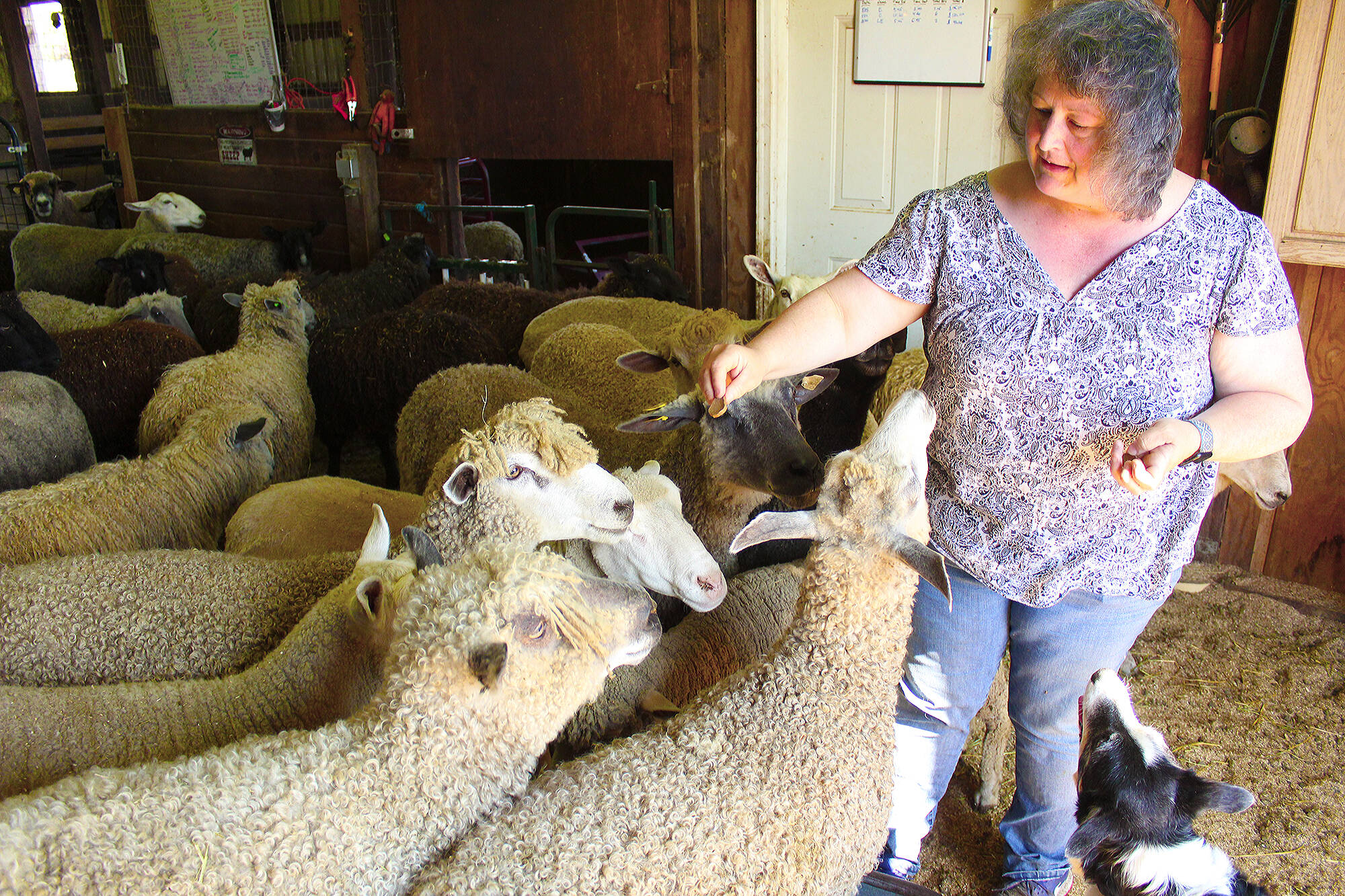One of the first things Carolynn Bernard will tell you is that she’s a lousy farmer.
But she makes it up in spades with love and caring for all her animals — her sheep especially — which is why she started a GoFundMe to help her feed foster sheep as she finds them new homes.
Her farm, the Bless Ewe Sheep Company & Sanctuary in Enumclaw, started as a way to work rescued border collies and help Bernard manage her PTSD from the Air Force. She got her first flock in Yelm in 2010, but moved to Enumclaw the next year.
Although Bernard had a friend to help work the dogs, she was a vet tech; with Bernard on 100% disability, all the sheep care fell to her.
“She started getting so mad at me, because she would come back and she’d work the dogs and she’d ask, ‘You’ve been petting the sheep, haven’t you?’” Bernard said in a recent interview. Of course, she had been — “The sheep kept getting friendlier and friendlier… and I fell in love with them.”
At first, Bernard did all the things sheep farmers normally do: sheer wool, breed ewes, sell lambs, and, of course, send some to the butchers. But she quickly found out she didn’t have the stomach to send her sheep up the slaughter chain, even when she switched to using a local halal butcher — hence her joke about what sort of farmer she is.
“I brought these babies into this world… they become my friends,” she said. “They’re wonderful mothers, wonderful little creatures; I’ve seen them love their babies and grieve when their friends die, and I just can’t do it.”
The income from shearing and breeding was enough to sustain the flock revenue-wise, but then the 2021 alfalfa growing season was hit with excessive heat and drought, sending the price of the hay and other sources of food for sheep skyrocketing. In turn, lamb sales dried up (ewes eat twice as much food to prepare for pregnancy and while they’re carrying) — and some farmers, now unable to feed their flock, started sending their sheep away to be slaughtered.
That’s where Bless Ewe comes in: to give those sheep a chance at living out their lives comfortably, especially those with “special needs” that likely won’t ever make any money through breeding or wool. Some will stay on the farm until they die; others will find new homes to live in, ones that Bernard thoroughly vets.
“My goal is to keep them out of the slaughter chain,” she said.
Currently, Bernard has almost 100 sheep — and can name them all — but not nearly enough money to feed them; during the interview, Bernard pointed to a round bale of local grass in the middle of the barn.
“I need 70 of them to get through the winter,” she said.
And Bernard’s service benefits only go so far (in fact, her income situation can be accurately described as “deep poverty”), so she’s relied on GoFundMe to crowdsource some revenue.
The first fundraiser started August 2021, and raised about $8,500; another was created last April, and saw nearly $7,000 come in.
The most recent was posted Aug. 14, and the goal is to raise $15,000 — enough for 20 tons of alfalfa and 70 round bales of local grass, she estimated.
You can head to gofundme.com/f/bless-ewe-sanctuary-farm to provide Bless Ewe a one-time donation, but you can also head to the farm’s Patreon (go to patreon.com and search for the farm) to give Bernard money every month. All donors get access to exclusive content (a.k.a. pictures and videos of the sheep), but donors who give more money can opt to “adopt” a sheep and receive specific updates on their new wooly friend, or even have Zoom calls with them.
Bernard also has an Etsy store where she sells products made from her sheep’s fleece, revenue which also goes into the sanctuary; products will be returning to the online store soon, she said.
At the moment, the Bless Ewe sanctuary is not an official 501(c)3 nonprofit organization, but Bernard said she’s hoping to get through that process soon so supporters can file their donations as a tax deduction.
Once the sanctuary is in a stable financial situation, Bernard hopes to resume taking in more rescues — she’s had to put a hold on taking in more sheep until she’s able to feed the ones she has.
“I can’t take anybody on before I can take care of what I got,” she said.
Other future plans also include inviting other vets suffering from PTSD to come and be with her sheep as a form of animal therapy, something Bernard said has helped her tremendously over the years.


